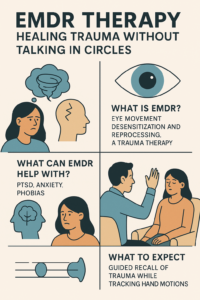👁️ EMDR Therapy: Healing Trauma Without Talking in Circles
 By Dr. Srinivas Rajkumar T, Consultant Psychiatrist
By Dr. Srinivas Rajkumar T, Consultant Psychiatrist
🔍 What is EMDR?
EMDR (Eye Movement Desensitization and Reprocessing) is a powerful, structured form of psychotherapy that helps people recover from trauma and distressing life experiences—including:
-
PTSD (Post-Traumatic Stress Disorder)
-
Anxiety and panic attacks
-
Phobias
-
Childhood abuse
-
Grief, loss, and breakups
-
Medical trauma (e.g., ICU stays, surgeries)
Unlike traditional talk therapy, EMDR doesn’t focus on changing thoughts—it focuses on processing memories in a way that the brain can finally let go.
🧠 How Does EMDR Work?
When a traumatic event occurs, the brain can sometimes fail to process the memory properly.
Instead of being filed away as “something that happened,” the memory stays raw—triggering the same emotional and physical response as if it’s happening again.
EMDR uses bilateral stimulation (such as eye movements, tapping, or sounds) while the patient focuses briefly on the distressing memory. This helps the brain reprocess the experience, storing it more adaptively.
🧭 Think of it like converting a rough, unedited file into a stable, compressed version your brain can store without crashing.
🎯 What Makes EMDR Different?
| Feature | EMDR | Traditional Therapy |
|---|---|---|
| Primary focus | Memory reprocessing | Insight, emotional awareness |
| Talk-heavy? | No—minimal verbal discussion | Often more conversational |
| Duration | Shorter (6–12 sessions) | Variable |
| Evidence base | Strong for PTSD, growing for anxiety, grief, and phobias | Strong for many conditions |
| Medication required? | No (can be combined if needed) | Optional |
🌀 What Happens in an EMDR Session?
EMDR follows an 8-phase structured protocol, but the core component is:
🔄 “Dual attention” — focusing on the memory while engaging in rhythmic bilateral stimulation.
This might include:
-
Moving your eyes back and forth following the therapist’s fingers
-
Listening to alternate sounds in both ears
-
Tapping gently on your knees or shoulders (called “tactile tapping”)
Patients are asked to:
-
Recall the distressing image
-
Identify associated thoughts and body sensations
-
Rate the level of distress
-
Allow their mind to go wherever it needs—while the therapist guides with gentle prompts and rhythmic movements
✅ What Can EMDR Help With?
EMDR is especially effective for:
-
Single-incident trauma (accidents, assaults, medical events)
-
Childhood abuse or neglect
-
Witnessing violence or disasters
-
Grief, complicated bereavement
-
Performance anxiety, phobias, public speaking fear
-
Negative self-beliefs (e.g., “I’m not good enough”)
✨ Real-Life Example
Priya, a 28-year-old software engineer, experienced panic attacks after a road accident. She had intrusive images, avoided driving, and felt stuck.
After 8 EMDR sessions:
-
The accident memory felt “far away”
-
She could drive again without panic
-
Her body no longer reacted with tightness and breathlessness
“It’s like I remember it happened—but it doesn’t control me anymore.” — Priya
💡 Who Should Consider EMDR?
EMDR may be right for you if:
-
You have a painful memory that still feels “fresh” after months or years
-
Talk therapy hasn’t helped much
-
You want a non-medication option
-
You feel stuck, reactive, or overwhelmed by certain situations
📌 Note: EMDR should only be administered by trained therapists. It’s not DIY therapy.
🧘 EMDR is Not Hypnosis or Brainwashing
You remain fully awake and in control during the session.
It is not about erasing memories, but reducing their emotional charge.
👨⚕️ My Role as a Psychiatrist
As a Consultant Psychiatrist based in Chennai (Apollo Clinics – Velachery & Tambaram), I:
-
Identify patients who may benefit from EMDR
-
Collaborate with trained clinical psychologists certified in EMDR
-
Offer integrated care with medication + trauma-informed therapy
-
Monitor progress and adjust treatment plans accordingly
📞 Book a consultation: 8595155808
🌐 Online consultations available
🧾 Final Takeaway
If you’re haunted by the past or stuck in patterns triggered by old wounds, EMDR offers a path to healing that doesn’t require endless retelling or years of therapy.
“It happened. But it no longer defines me.”
That’s the power of EMDR.